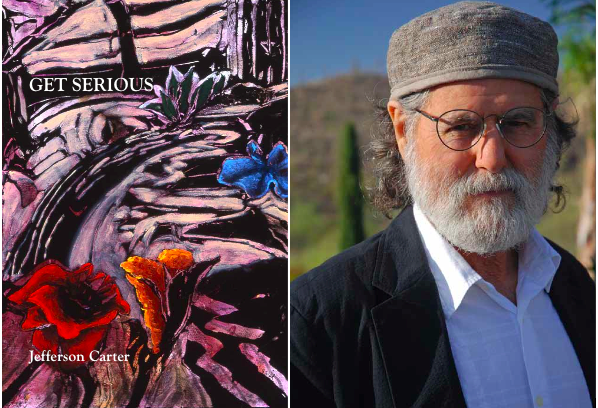The poetry of re-formation
A review of Jefferson Carter's 'Get Serious'

Get Serious: New and Selected Poems
Get Serious: New and Selected Poems
After eight collections of poetry, a poet usually arrives at a point when a “new and selected” is a natural, a given, if not something of an earned entitlement; a milestone in any case. This is no less true for Jefferson Carter’s Get Serious, a gathering of the best of a poetry that is as original as conditions of originality permit, so much so it seems to stand alone, like a night club in a cemetery.
What allows for this is an architecture so consistent and noticeable it might be called Carterian — a muscular, sharp-edged concision of cropped allusion, unexpected Martianesque references, Taser-like in their effect, often packed into a Euclidian block, a vertical rectangle. The experience is similar to entering a Scandinavian furniture store, austere and sparse, then having the back wall fall away — that vertical rectangle — becoming a portal to another biosphere. Typical of this unique aggregation is “Pasture”:
To a narcissist, all
the world’s a mirror.
The day I misread
the no trespassing sign
in the laundromat window
as no trepanning, I retired
from narcissism. I stopped
worrying about my headaches.
I’m not so lonely now
& even a goat isn’t just
a goat. I told my neighbor
my lawn’s a pasture & today
I saw a herd, fainting goats
he calls them, grazing there.
These poems, consistent with others that form Carter’s oeuvre, hold promise for a wide literary readership if for no other reason than they offer an alternative that has immediate appeal, and occupies its own territory. They may even be said to bridge the distance between a literary populism claimed (in one way or another) by “New” Formalism that never seemed to have actually occurred (owing to its own nineteenth-century strictures that exclude the more absurd details of contemporary conditions) and literary extremes like those oblique assemblages of language and letter-art bricolage used to produce objects simply as objects, to remain intentionally unreadable in any conventional sense.
The speakers in Carter’s poems are overwhelmed souls, so confounded by the ridiculous, they can only find solace in a bewilderment that consoles through the otherwise unnoticed, the ordinary, a consolation that is wry, amusing, and endearing, like a discovery of “a school for famous readers” from the sound of sow bugs in a shower:
Writing in the Shower
I wanted something
Eastern European, you know,
something portentous
in the best sense of the word,
but what I managed was
two lines of Southwestern
animal husbandry, half
a simile comparing
something wet to a teaser
stallion on a stud farm
& I was too busy
to mention the sow bugs
in the shower stall,
which echoed like a school
for famous readers.
Carter’s poetry could have easily slid sideways into esoteric extremism — the current pressures are all there — or become another casualty in the landfill of the all-too-dense poetry that attempts to describe itself throughout so many poets’ careers, or sink into the mordantly oblique, but it has found its own re-formation among what has either been impulsively discarded or ignored by others, making itself necessary to an understanding of emerging sensibilities that, science tells us, are in a perpetual state of progressive development.
This, and a knowing laughter, humane and caring, necessary to enduring the worst of our tragedies — the laughter of Calvino, or what Hesse attributed to those magnanimous souls in his literary and musical panthéon — constitute a contribution to the enterprise of the poetry of our era. Above all, this collection is a notable contribution to the evolution of poetic consciousness.
The Mummy
Wrapped in my blue & white-striped
100% Egyptian cotton bed sheet,
I skulk in the vestibule. What a word —
ves.ti.bule, the last syllable
like breathing on a mirror. I overheard
two girls laughing about their teacher
arrested taking out the garbage
in his underwear. I say more power
to him. I’ll say to those girls the night
I catch them, have a little mercy.
Mercy, a word that sounds
like someone swallowing flowers.